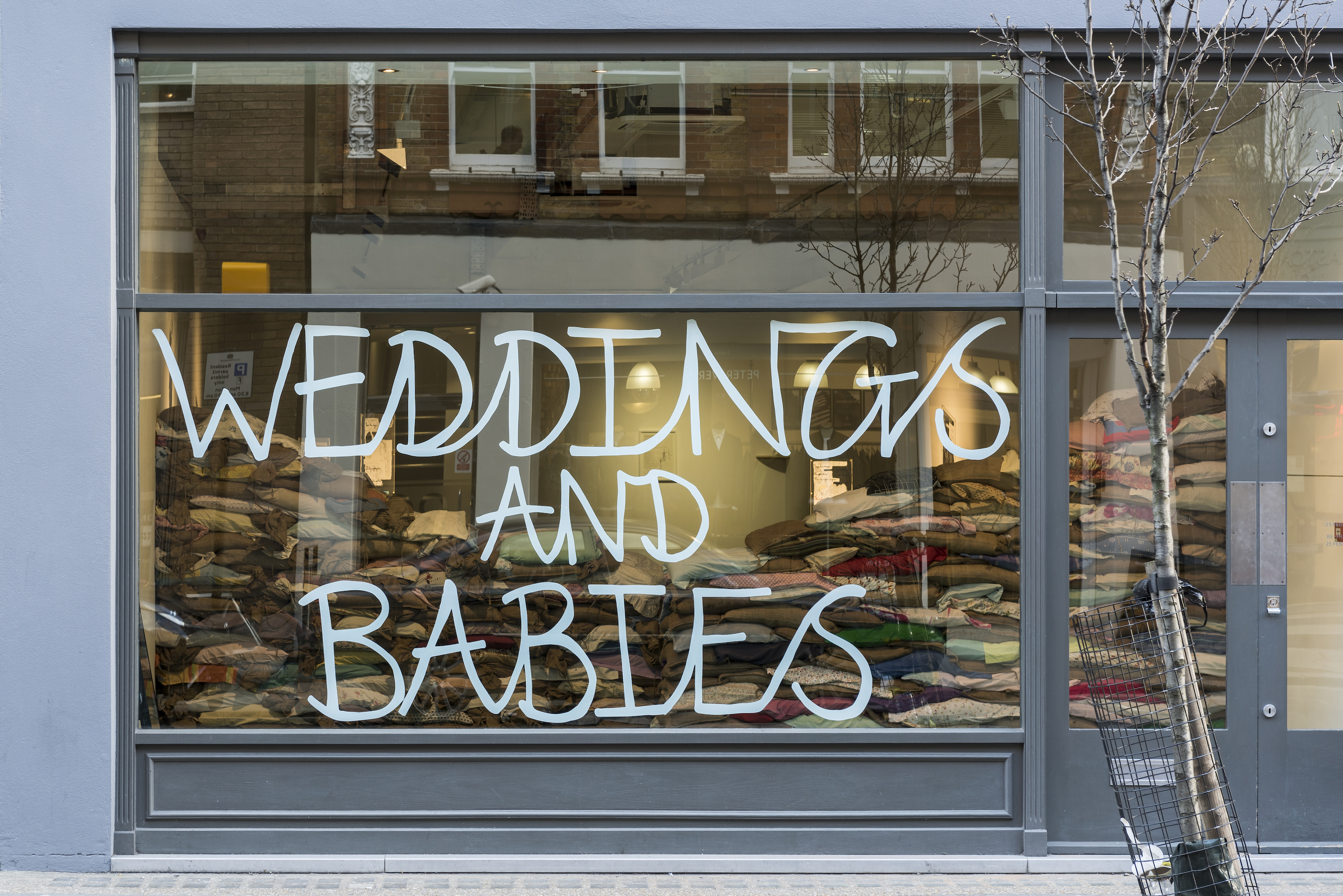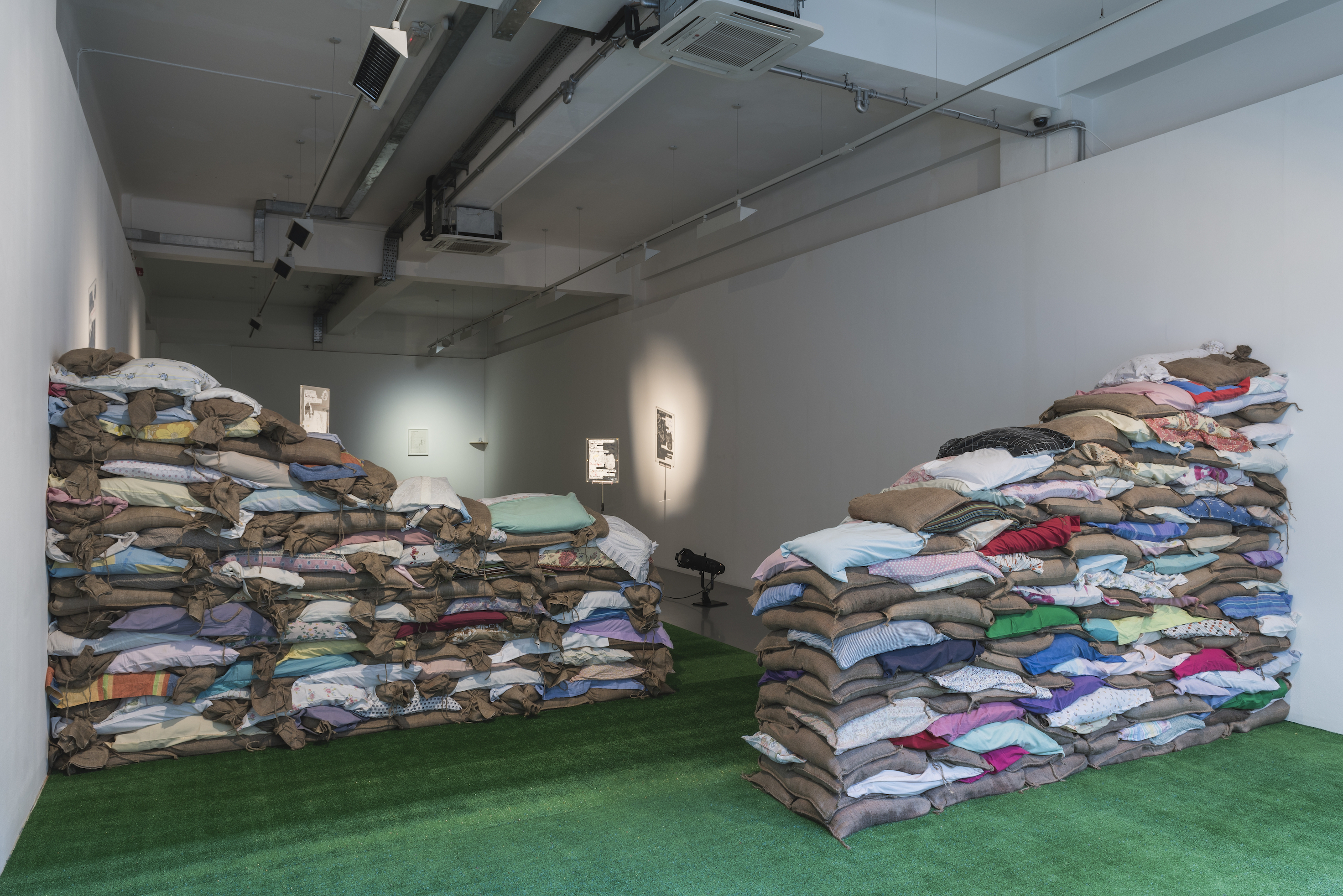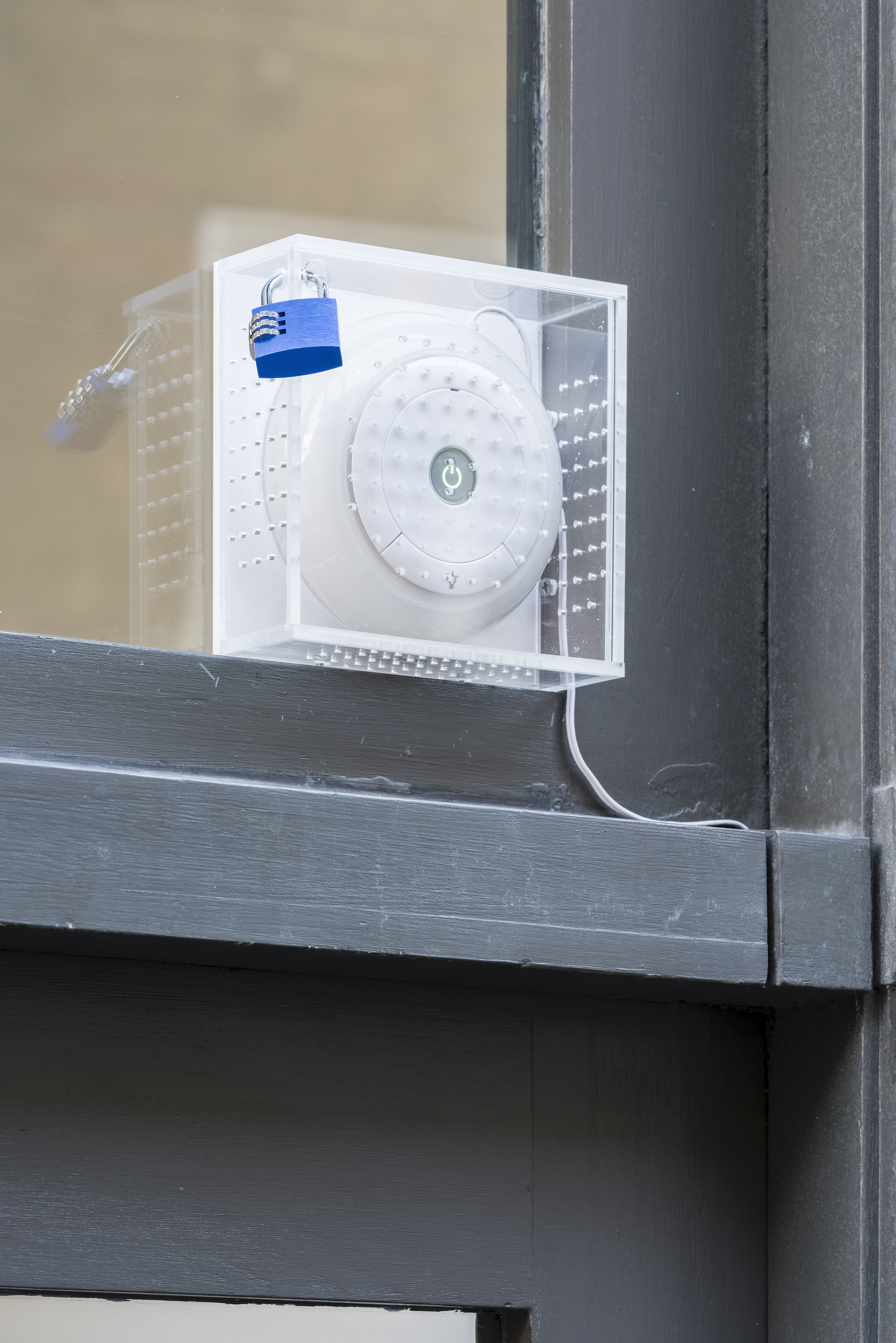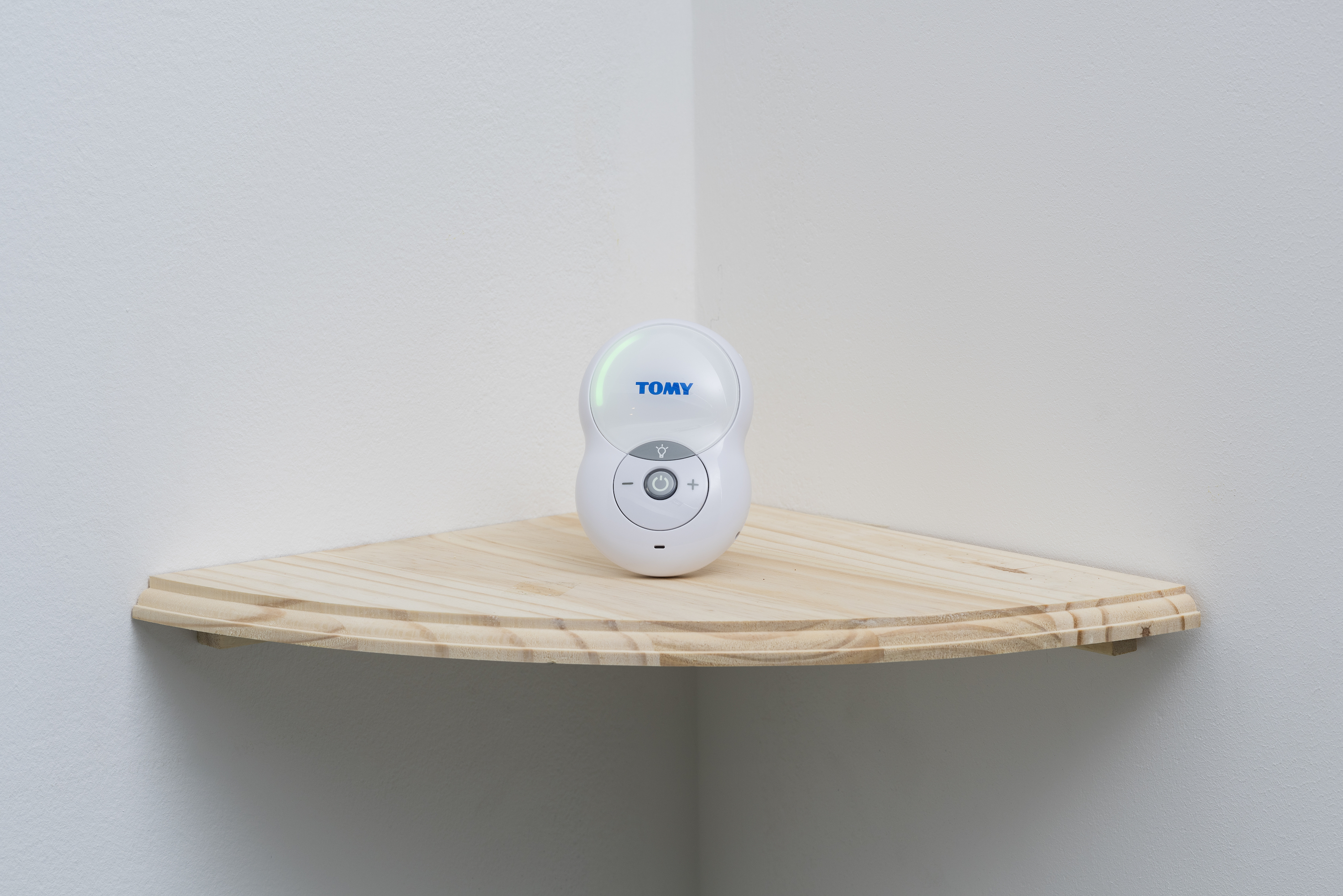WEDDINGS AND BABIES | 2017
Solo exhibition at Pilar Corrias, London 2017
Untitled (Love and Patience), 2016, Digital video 8’ 60”, installed as continuous loop
Filmed in Brussels by Alice Theobald
Music composed by Alice Theobald


1. Corner Bath, 2017, Gesso paint, ink, perspex, microphone stand, 50 x 40cm
2. I don’t like your tone, 2017, Gesso paint, ink, perspex, microphone stand, 50 x 40cm
WEDDINGS AND BABIES a letter by Phoebe Blatton
Dear Alice,
It feels so formal to address you as ‘Alice’ (‘Ah-lees’, as your French mum says it) because we always call each other ‘sis’. You’re lil’sis, even though we have different parents, of course. Do you remember how that started? Mutual friends had been telling us how much we’d get along before we finally met at a dark, busy pub in London one summer night in 2008. It must’ve been someone’s birthday. We slung our arms around each other’s shoulders. ‘Hello, sis,’ I said. ‘Hello, sis,’ you responded. Or was it the other way round? Either way, it worked.
We immediately enjoyed the performance of being sisters - a bond neither of us have in actuality - and began to make films that reflected our fantastical sisterhood. As sisters on film, we’ve grown old in the same house, spitting milk in each other’s faces, and in a film based on a story by Donald Barthelme named Heather, miraculously made a child together. ‘Us did it,’ the sisters tell their confused suitor, who’s been sleeping with them both and wants to know who the mother is, ‘We’. We decided to use my family’s pet dachshund as the stand-in for baby Heather, which reminds me that you’ve already worked with dogs and babies.
It fits that you’d reject the common advice, ‘never work with animals and children’. You are the kind of person that finds the rewards in working with a challenging cast, from your most un-thespian friends to an over-sixties Am-dram group called The Hot-Pots. You think about things and plan with all the precision of a professional, but you’re a champion of the un-trained, the under-dog, the preposterous. You’re often the one sitting quiet for a while, before offering a rather succinct yet nuanced take on the matter at hand, and this is one of the many reasons why the ‘errors’ in your work seem trustworthy, embraced rather than simply permitted.
Writing a letter to you like this is certainly a bit corny, it’s such a hackneyed device for writing a text that is really meant for the external reader, in this case the visitors to your exhibition. I’m definitely treading into the dangerous waters of ‘quirkiness’ that we’ve talked about, that word so imbued with femininity, as though that were a bad thing. But I’m also doing it on purpose, as a mild provocation, a retort, if you like, to that exact, under-minding fear. I’m thinking of you at this moment, preparing an exhibition of work about men and babies against the back-drop of Donald Trump’s first week as President of the United States of America. The pervading image in my mind is of Trump sat at his desk, thrusting into the age-old, man-handled mahogany as he signs away the reproductive rights of women in every place his power holds forth, flanked by the white men of his administration lecherously looking on.
 Titled (Weddings and Babies) 2017, white vinyl, dimensions variable.
Titled (Weddings and Babies) 2017, white vinyl, dimensions variable. Something just happened; I re-read the sentence where I said that you were ‘a champion of the under-dog’, and reflected on the cliché of that phrase, and, of course, how it’s been applied so speciously to that man.
Weddings and Babies is another cliché, taken from the signs outside Photographers’ studios advertising their services for the two things people want commemorated most; their weddings and their babies. It’s also the title of a film from 1958 by Morris Engel. The film’s protagonist is a photographer whose girlfriend wants to get married and start a family. I note how it’s always put more-or-less like that; it’s always the ‘girlfriend who wants to get married’, which she really does in this case, but anyway, I think you’ll get the point. The plot follows the motions of his delay, which is couched in a wish to become more financially secure, look after his aging mother, and fulfill his dreams of becoming a director. That other stock-phrase, ‘just married’, comes to mind, but with the emphasis on ‘just’ married.
Like many naturalistic films of the era, it has that tootling incidental music (often played on an oboe, a flute, some kind of plucky percussion) that, to my mind, can jar when I hear it today. It’s so quintessentially mid-century; clearly influenced by Jazz and modernist composition. I remember being most keenly aware of it watching A Taste of Honey (1961). There is a scene, sensitively free of music, when the pregnant, teenage Jo smashes a baby doll, screaming; ‘I don’t want to be a mother, I don’t want to be a woman!’ It is a line that sears through the celluloid, that preserve of the ‘male gaze’, that rages in antithesis to its fellow voices of the ‘Angry Young Men’ generation, and reveals the play-write behind the script, a working-class eighteen year old named Shelagh Delaney. But soon enough, the buoyant music so typical of the film’s composer, John Addison, returns in all its cultured, ironical quirks.
The music you compose for your films often sounds like it pays a kind of impudent homage to such scores. I think you do it with an ear for the awkwardness it invokes in a modern audience, a knowing audience, well-aware of how they are being manipulated.

 1. He never imagined he’d be so moved, 2017, stairlift, sound, 9min 49sec continuous loop.
1. He never imagined he’d be so moved, 2017, stairlift, sound, 9min 49sec continuous loop.2. Baby gargoyle, digital print wallpaper, 2017, dimensions variable
In an email that you wrote to me recently, you said; ‘I will never be a man.’ I imagined you declaring it
aloud, solemnly nodding to yourself, not because you’d want to be a man, but rather because you’re inclined towards the possible. I’m only used to such definitive statements coming out of your mouth with an air of camp, which isn’t to say they’re not often entirely to the point. I’m thinking about that line in relation to what Jo says in A Taste of Honey, about not wanting to be a woman. Jo doesn’t want to be a woman because she is pregnant in an age before abortion was legal, the father is a black sailor who has left town unaware of the situation, and the baby will be born ‘the wrong colour’ (as she puts it) for the racist times she lives in. She has little money and little reason to imagine that she’ll ever have any. The choices for Jo are so slight that all she can articulate is what she doesn’t want. There’s no hyperbole in her concept of ‘never’. In that email, you went on to say. ‘I may certainly at times relate more to a specific male than to a specific female but we will always have different bodies that have the potential to do different things with different biological timings, different social histories and projections etc...’

Second Best, 2017, Gesso paint, ink, perspex, microphone stand, 50 x 40cm
In your film, The Next Step, the British male voices poses a contemporary manner of speaking that is so normal. That’s a controversial word, but I mean it in the sense that they don’t seem extremely anything in particular, and of course they’re white men. You’re more than familiar with this certain kind of British man, and a British culture of having babies. You laughed when we spoke last, saying how an exhibition about men and babies is so un-cool, in a way.
It feels like it is not so much the question of choice that’s at stake for these men, but rather figuring out what their choices might be. The joke is that we’re hearing their voices whilst looking at a dog and a baby who have no choice at all in what they are, and there’s the inevitable moment where I imagine the conversation I’m hearing is, in fact, between the dog and the baby. The dog looks like a German Shepherd, certainly one of the more macho breeds, but it might be a bitch. I don’t definitively know what sex the baby is, but I’m aware of how quickly the sight of a dad pushing his baby in a buggy round the park makes me think that he’s a ‘modern man’, in other words, one who is ‘comfortable with his feminine side’. Is it depressing to think how quickly the dog and baby are gendered, or associated with gender?
Are you interested in inhabiting a male perspective? You’ve reflected on how male directors have regularly assumed the perspective of women, and how unbalanced this is. The male perspective is something I know many feminists are simply too exhausted to care about right now. I wonder why you care, or if, in fact, you’re doing what those male directors have done, and are projecting yourself on to the characters? We were born in the 1980s, the children of Margaret Thatcher - ‘Milk Snatcher’, as the saying goes, after she stopped the provision of free milk in schools, an act made all the more villainous by the fact she was the first woman Prime Minister of Great Britain. Why? I think people are still confused by the fact that if a woman has taken power, she is somehow the success of womanhood, when she is still very much a product of, or a reaction to, the Patriarchy.
Thatcher famously proposed that ‘There is no such thing as society: there are individual men and women, and there are families.’ We’re still living under that neo-liberal mantra. It’s cracked and desperate, because there is such a thing as society, but it’s all the more shrill and powerful for the fight. Perhaps that night we became sisters, we made the terribly small gesture of showing each other that we are more than individual men and women, and families are what you want them to be. Maybe we should’ve become brothers; in fact our relationship is far more in line with the tropes of a bro-mance than the more psychologically dark stereotypes of sisterhood. I come to this point of signing off, and I feel like some of the things I’ve thought about, writing to you, considering your work and the way you approach things, are really now the stuff of a conversation I’d like to continue.
Write me back sis, when the exhibition is over, and you’re thinking about the next step.
– Phoebe Blatton, 2017

Weddings and Babies, 2017, sand, hessian, polystyrene, pillow cases. 600 x 200 x 50cm


Little Brother, 2017, Tomy The First Years baby monitor, perspex, code lock, wooden shelf, dimensions variable